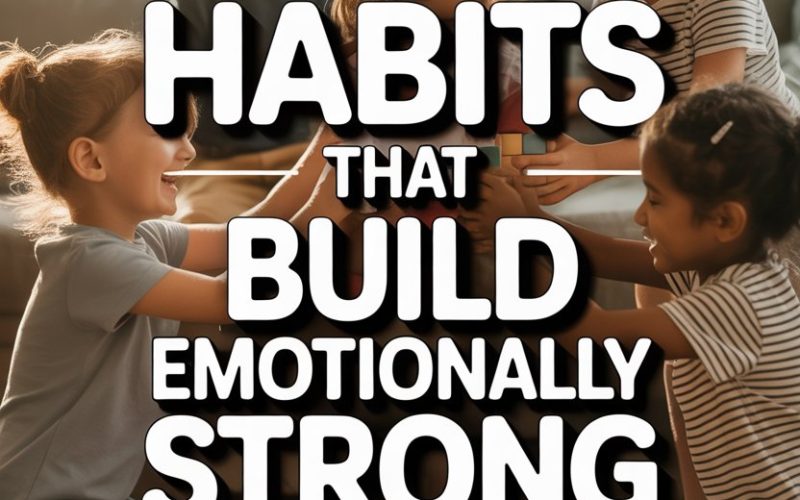Parenting advice usually comes at you faster than socks vanish from the laundry—everyone’s got a theory, a study, or “what worked for us.”
But if you want kids who can handle big feelings, rough patches, and the odd playground drama, there are certain habits that really move the needle.
And no, these don’t require a PhD in child psychology or a free Saturday afternoon (as if those exist).
On to the good stuff: here are five habits, backed by real research and actual parents, to help your kids become more resilient, self-aware, and just… emotionally solid.
1. Talk About Feelings Like They’re the Weather
Ever noticed how children, when you ask how school was, suddenly become tight-lipped or give you the classic “fine”?
Turns out, kids don’t magically know how to talk about feelings. They need a bit of modeling.
Try weaving feelings into regular conversation.
Instead of “How was your day?” throw in “What was something that made you feel proud today?” or “Did anything frustrate you?” At the dinner table, mention your own feelings (“I felt a bit frazzled at work, so I took a walk to clear my head.”)
This sort of emotional vocabulary builds what child psychologists call “emotional literacy,” which helps kids recognize, name, and manage their own emotions.
Those big feelings—anger, embarrassment, sadness—start to feel less scary when they’re discussed openly. You don’t need a special puppet or emotion chart (though if those help, go wild). Just keep the conversation going.
According to Yale’s Center for Emotional Intelligence, kids who can name their feelings are better equipped to handle them—sort of like having an umbrella when it starts to rain.
2. Model Mistakes and Bouncing Back
Nobody’s perfect. Not even you, dear parent (though you come close on Fridays after 9pm). Kids learn how to handle setbacks by watching what you do when things go pear-shaped.
Spilled your coffee, burned the toast, forgot to respond to that school email (again)? Narrate it calmly: “Well, that didn’t go as planned. I’m frustrated, but I’ll try again.”
Children who see adults cope with mistakes without melting down or blaming others pick up the same tricks. This is called a “growth mindset,” popularised by psychologist Carol Dweck, and it’s pure gold for future resilience.
Next time your child goofs up—maybe a failed spelling test or a toppled Lego tower—resist the urge to fix everything or play down their disappointment.
Instead, talk through what happened, what could help next time, and how everyone feels.
The message: mistakes are for learning, not for panicking.
3. Keep Routines (But Stay Flexible Enough to Survive Life)
Predictability is comforting for children. Consistent routines (think bedtime, mealtimes, morning chaos) give kids a sense of security, anchoring them when big feelings or changes come their way.
But life with kids isn’t exactly a Swiss train schedule. Curveballs happen.
A healthy emotional foundation isn’t about rigidly sticking to plans no matter what—it’s about having a steady rhythm that can bend when necessary.
Researchers at the University of Albany found that children with regular daily routines show fewer behavior problems and have higher emotional well-being, especially when those routines include warmth and connection.
Start small: maybe it’s a bedtime story, a high-five in the morning, or a weekly “pancake Saturday.”
When routines do get disrupted (hello, surprise playdate or sudden tummy bug), talk about it. “We usually read before bed, but tonight we had to visit grandma.
Things change sometimes, and that’s OK.” That blend of structure and flexibility teaches your child the world is reliable, but manageable—even when it throws curveballs.
4. Teach Problem-Solving (Without Jumping in to Save the Day)
The urge to rescue: it’s strong, and it’s real. Whether it’s a sibling squabble or missing trainers before school, it’s tempting to swoop in and sort it out yourself—after all, things move faster that way.
But kids need chances to work through problems themselves. Start by asking questions (“What do you think would help?” or “How could you and your sister both use the blue crayon?”), rather than handing out solutions.
Stanford research shows that children who practice problem-solving develop more confidence and independence.
Try “do-overs” when things go sideways. Siblings fighting? Pause the action: “Let’s try that again—what could you say instead?” Encourage brainstorming, even if the ideas are wobbly.
The goal isn’t perfect negotiation skills by age seven—it’s helping kids realize their feelings and choices matter, and they can influence what happens next.
If you’re crunched for time (aren’t we all), even a quick “What’s your plan?” before jumping in teaches your child to think things through.
You’re not abandoning them; you’re giving them a test run at real life.
5. Make Time for Play and Connection, Even in Mini-Doses
Play isn’t just for keeping children quiet while you finally fold the laundry. It’s a stress-buster, communication booster, and a natural way for children to work through emotions.
Life gets busy, and nobody expects you to orchestrate elaborate craft projects or Instagram-worthy nature walks every weekend. But a five-minute pillow fight, a silly dance in the lounge, or a shared family joke counts—big time.
According to Harvard’s Center on the Developing Child, playtime with caring adults builds secure attachment, increases emotional regulation, and even improves brain development.
Connection doesn’t have to mean grand gestures. It’s eye contact at breakfast, a silly nickname, or shared laughter.
These micro-moments tell your child: you matter, you’re safe, and you’re loved—no matter what. When kids feel connected, they’re more likely to open up about tough feelings and handle stress without imploding.
Short on time? Even narrating the school run (“Did you see that enormous dog? I bet he ate two breakfasts!”) or inventing a handshake for goodbyes can create little anchors of connection.
The Payoff: Raising Kids Who Weather Life’s Storms
Building emotionally strong kids doesn’t require superhero-level patience or a color-coded family calendar. It’s about small, daily habits that create a sense of security, trust, and self-knowledge.
Talk about feelings, fumble through mistakes, keep routines (but don’t panic when they go off-script), offer space for problem-solving, and sprinkle in play whenever you can.
These habits stack up, making it more likely your child will face life’s wobbles with a bit of grit, a dose of self-awareness, and maybe even a laugh.
And when you find yourself wondering if any of it’s sinking in, remember: kids don’t usually thank you for raising them to be emotionally strong.
But one day, when they weather disappointment or navigate friendship drama without collapsing, you’ll know you’ve given them the good stuff—no printout required.




